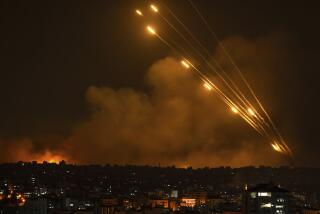The Tragedy of Kid Soldiers
- Share via
Ishmael Beah was 13 years old when soldiers in Sierra Leone dragged him onto the battlefield. His family had disappeared during that West African nation’s civil war, and he wandered the countryside starved for food and solace. As he told students at Southern California high schools and colleges last week, he eventually turned to the army. Suddenly he found an automatic rifle in his hands.
“At first I couldn’t pull the trigger,” he said. “I was lying almost numb in ambush watching kids my age being shot and killed. The sight of blood and the crying of people in pain triggered something inside me that I didn’t understand and made me lose compassion for others. I lost my real being.”
He found peace, he said, “writing song lyrics about the good times before the war.” Then one day, amid war’s chaos, a relative rescued Beah and enrolled him in school. But 300,000 other children, some as young as 8 years old, are currently fighting wars in Angola, Burma, Colombia, Sierra Leone, Sri Lanka, Congo, Afghanistan and many other countries.
Hoping to save some of these children from the loss of innocence he experienced, not to mention the loss of their lives, Beah has joined the Human Rights Watch Student Task Force, a Los Angeles-based advocacy group that is calling on members of the Senate Foreign Relations Committee to support U.S. ratification of an international agreement to prohibit armies from enlisting children as soldiers.
The committee should recommend to the Senate the ratification of the so-called Optional Protocol to the Convention on the Rights of the Child, which prohibits the forced recruitment of children under 18 and voluntary participation under 17.
Ninety-four countries, including the United States, have signed the protocol, but only 14 have ratified it. The Bush administration has indicated that it considers ratification a priority. The Senate should push for that action. Not that existing mechanisms can fully enforce the ban. But anything that civilized nations can do to make the inherent inhumanity of warfare less so is worth pursuing.
More to Read
Sign up for Essential California
The most important California stories and recommendations in your inbox every morning.
You may occasionally receive promotional content from the Los Angeles Times.













